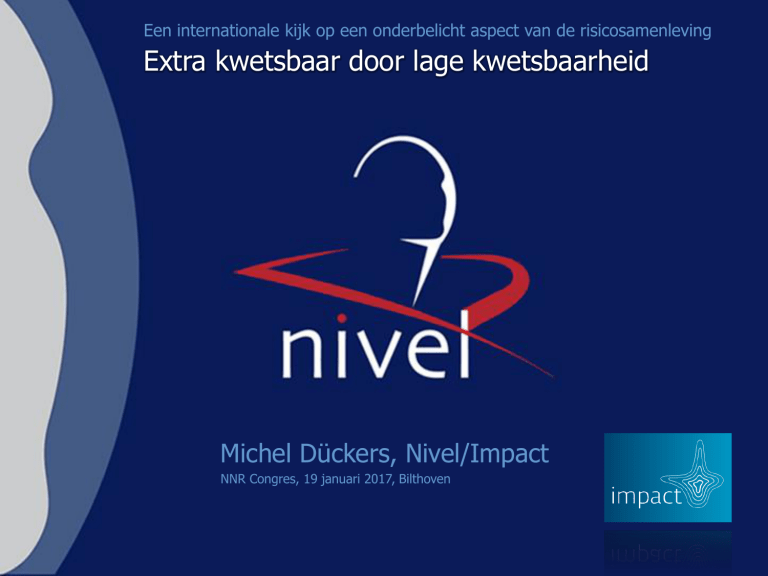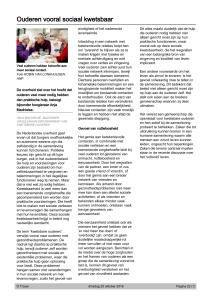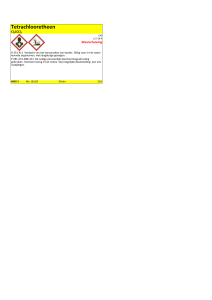
Een internationale kijk op een onderbelicht aspect van de risicosamenleving
Extra kwetsbaar door lage kwetsbaarheid
Michel Dückers, Nivel/Impact
NNR Congres, 19 januari 2017, Bilthoven
Wat is kwetsbaarheid?
Definition of vulnerable:
1. capable of being physically or emotionally wounded
2. open to attack or damage : assailable <vulnerable to
criticism>
3. liable to increased penalties but entitled to increased
bonuses after winning a game in contract bridge
- Merriam Webster Dictionary
Kwetsbaarheid
van mensen
Geslacht
Leeftijd
Sociaaleconomische status
Sociale steun (feitelijk, gepercipieerd)
(Dreigende) blootstelling aan ellende: moord,
rampen, verkrachting, ongelukken, mishandeling
etc.)
Bestaande psychische problemen
Verder bronverlies (“alles van waarde”)
Wat is kwetsbaarheid?
“To love at all is to be vulnerable. Love anything and
your heart will be wrung and possibly broken. If you
want to make sure of keeping it intact you must give it
to no one, not even an animal. Wrap it carefully round
with hobbies and little luxuries; avoid all entanglements.
Lock it up safe in the casket or coffin of your selfishness.
But in that casket, safe, dark, motionless, airless, it will
change. It will not be broken; it will become
unbreakable, impenetrable, irredeemable.
To love is to be vulnerable.”
- C.S. Lewis, The Four Loves
Wat is kwetsbaarheid?
“Out of your vulnerabilities will come your strength”
- Sigmund Freud
Kwetsbaarheid
van landen
Kwetsbaarheid
en cultuur
Group 1 (N=18): Finland, Norway, Sweden, Switzerland, Austria, Denmark,
Netherlands, Germany, Japan, Luxembourg, New Zealand, Australia, Belgium,
France, Canada, Great Britain, Ireland, Singapore.
Group 2 (N=21): South Korea, Slovenia,
Spain, U.S.A., Czech Republic, Estonia,
Greece, Italy, Portugal, Lithuania, Poland,
Slovak Republic, Malta, Uruguay, Croatia,
Hungary, Latvia, Bulgaria, Argentina, Chile,
Russia.
Group 3 (N=21): Romania, Serbia, Trinidad
and Tobago, Brazil, Malaysia, Mexico, Turkey,
Thailand, Venezuela, China, Iran, Colombia,
Peru, Vietnam, El Salvador, Philippines,
Morocco, Indonesia, India, Bangladesh,
Pakistan.
Legend:
VUL = Vulnerability score, PDI = Power distance, UAI = Uncertainty avoidance,
IVC = Individualism versus collectivism, MVF = Masculinity versus femininity,
LVS = Long-term versus short-term orientation, IVR = Indulgence versus restraint
Dückers MLA, Frerks GE, Birkmann J. Exploring the plexus of context and circumstances: An empirical test of a theory
of disaster vulnerability. International Journal of Disaster Risk Reduction 2015; 13 (3): 85-95.
Prevalentie van PTSS
Lifetime prevalence in 24 landen (N = 86.687)
Komen trauma-gerelateerde
klachten wereldwijd even vaak voor?
Dückers MLA, Alisic E, Brewin CR. A vulnerability paradox in the cross-national prevalence of post-traumatic stress
disorder. British Journal of Psychiatry 2016. 209 (4), 300-305.
Kwetsbaarheidsparadox
Lifetime PTSS geschat in vier modellen
Model 1
Model 2
Dückers MLA, Alisic E, Brewin CR. A vulnerability paradox in the cross-national prevalence of post-traumatic stress
disorder. British Journal of Psychiatry 2016. 209 (4), 300-305.
Kwetsbaarheidsparadox
Lifetime PTSS geschat in vier modellen
Model 3
Model 4
Dückers MLA, Alisic E, Brewin CR. A vulnerability paradox in the cross-national prevalence of post-traumatic stress
disorder. British Journal of Psychiatry 2016. 209 (4), 300-305.
Kwetsbaarheidsparadox
16 landen in vier groepen
High
exposure
(> 67.14)
Low
exposure
(< 67.14)
High vulnerability
Low vulnerability
(> 36.23)
(< 36.23)
Colombia, Israel,
Lebanon, Mexico,
Blootstelling
AAN
South Africa
Australia, Canada,
Netherlands, New
Blootstelling
Zealand,
United AAN
States
Kwetsbaarheid AAN
Kwetsbaarheid UIT
Average lifetime PTSD:
2.1%
Average lifetime PTSD:
7.34%
Romania
Belgium, Germany,
Italy, Japan, Spain
Blootstelling UIT
Kwetsbaarheid AAN
Average lifetime PTSD:
1.2%
Blootstelling UIT
Kwetsbaarheid UIT
Average lifetime PTSD:
1.96%
Dückers MLA, Alisic E, Brewin CR. A vulnerability paradox in the cross-national prevalence of post-traumatic stress
disorder. British Journal of Psychiatry 2016. 209 (4), 300-305.
Kwetsbaarheidsparadox
% lifetime PTSD observed
vrouwen en mannen in 11 landen
Legend:
Gaat dit effect op
voor vrouwen en mannen?
1 = Australia
2 = Brazil
3 = Canada
4 = France
5 = Lebanon
6 = Mexico
7 = Netherlands
8 = Portugal
9 = Sweden
10 = Zwitserland
11 = Verenigde Staten
country vulnerability (0-100)
Dückers MLA, Olff M. Does the vulnerability paradox in PTSD apply to women and men? Journal of Traumatic Stress.
In Press.
Kwetsbaarheidsparadox
geestelijke gezondheid in 17 landen (databron: Kessler et al. 2009)
Gaat dit effect op
voor angststoornissen,
middelengebruik en
stemmingsstoornissen?
Ja
Dückers MLA, Brewin CR. A paradox in individual versus national mental health vulnerability: Are higher resource
levels associated with higher disorder prevalence? Journal of Traumatic Stress, 29 (6), 2016, p572-576.
Kwetsbaarheidsparadox
13 landen in drie groepen (databron AMD: Kessler et al. 2009)
High
exposure
(> 67.14)
Low
exposure
(< 67.14)
High vulnerability
Low vulnerability
(> 36.23)
(< 36.23)
Colombia, Israel,
Lebanon, Mexico,
Blootstelling
AAN
South Africa
Netherlands, New
Zealand, United States
Kwetsbaarheid AAN
Blootstelling AAN
Kwetsbaarheid UIT
Average lifetime AMD:
11.38%
Average lifetime AMD:
19.9%
No general population
prevalence data
Blootstelling
available UIT
Belgium, Germany,
Italy, Japan, Spain
Kwetsbaarheid AAN
Blootstelling UIT
Kwetsbaarheid UIT
Average lifetime AMD:
10.42%
Verklaringen
Het went: “hoe vaker iets misgaat,
hoe minder hard het erin hakt”
Een illusie armer: brute verstoring
gekoesterde ideeën over de wereld
Individualistische samenleving:
weinig beschermende sociale steun
ongehinderd door stigma
Systeem: meer professionele diagnostische capaciteit en gewoonte:
huisartsen & therapeuten, DSM taal
Meer neiging tot attributie
Samenvatting
Blootstelling is van alle tijden
Blootstelling aan gebeurtenissen en dreiging
werkt negatief door in onze gezondheid en
welbevinden
De context van een samenleving blijkt ertoe te
doen: culturele en sociaaleconomische
kenmerken spelen een paradoxale rol
Welvaart maakt vatbaar, welvaart heeft een prijs
Maar wat zegt prijs over waarde?
“
Hartelijk dank voor uw aandacht
Meer informatie:
Dr. Michel L.A. Dückers
NIVEL/IMPACT
m.duckers@nivel.nl/m.duckers@impact.arq.org
+316 1066 1321












